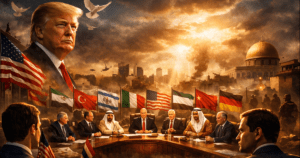The rise of Artificial Intelligence (AI) is poised to reshape the dynamics of global power politics, setting the stage for a future where technological superiority could determine geopolitical dominance. As nations race to harness the potential of AI, the implications for international relations, security, and governance are profound and multifaceted.
At the forefront is the potential for AI to exacerbate existing power imbalances. Wealthy nations with advanced technological infrastructures are better positioned to invest in AI research and development. This could deepen the divide between developed and developing countries, relegating the latter to the periphery of global decision-making. The digital divide may evolve into an AI divide, with access to cutting-edge AI tools becoming a new determinant of influence and power.
Moreover, AI’s application in military strategies is set to revolutionize warfare, introducing concepts like autonomous weaponry and predictive analytics for intelligence. While these technologies promise greater efficiency, they also raise ethical and strategic concerns. The unchecked use of AI in military contexts could lead to destabilization, with nations engaging in an AI arms race. The question of accountability in autonomous decision-making remains unresolved, posing risks of unintended escalations.
On the economic front, AI has the potential to redefine global trade and labor markets. Nations that lead in AI innovation could dominate key industries, shaping trade policies to their advantage. Conversely, countries unable to adapt to AI-driven automation may face economic marginalization, fueling social unrest and migration crises.
International governance mechanisms must evolve to address these challenges. Current frameworks, such as the United Nations, are ill-equipped to regulate AI’s transformative power. There is a pressing need for global cooperation to establish norms and treaties that ensure equitable access to AI while preventing misuse.
AI’s integration into power politics underscores the urgency for ethical considerations and inclusive policies. As humanity stands at this technological crossroads, the choices made today will define the global order of tomorrow. The challenge is not only technological but profoundly political ensuring AI becomes a tool for collective progress rather than a weapon of division.












